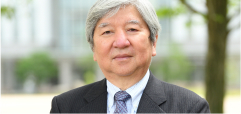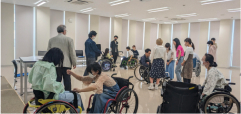新着情報NEWS
岐阜新聞 真学塾 外国語学部③ トンプソン アラン
Languages differ
岐阜聖徳学園大学外国語学部准教授 トンプソン アラン
People often think of languages as collections of words. Learn the words and learn the language. Word endings and word order sometimes present difficulties, but basically it is the words. Some words are easy to learn because they are nearly the same--Japanese 茶 (cha) and Chinese 茶 (chá). And there are so many words that Japanese and English share--ピックアップ、ゲット、アピール、クレーム. So we just have to learn the ones that are different, right?
But after we have tried communicating in another language for a while, we realise that there is more to it than that. How do we say お疲れ様 in English? Er... we don't. How about How are you? in Japanese? People don't usually do that either. As you can see, people say different things in different languages.
Moreover, we say similar things differently in different languages. In English, for example, we almost always say whether we are talking about one or many, singular or plural. Many newcomers to Japan are amused to hear Japanese people asking about 外国. They wonder, "Do they think that everything outside Japan is just one country?" Of course not. By 外国 they mean many countries. It just isn't so important in Japanese to make a difference between singular and plural. (Similarly, it is not so important in English to make a difference between familiar and formal relationships, as Japanese do with だ and です.)
Patterns of speaking in a casual conversation differ as well. In Japanese, it is ommon to answer with a word; in English, the answer is usually a quick phrase.
A: Where'd you go?
B: To the beach. (not Beach.)
A: Looks like a great place. Who'd you go with?
B: With my friends. (not Friends.)
And what about those words that English and Japanese share? Actually, in many cases, it's more like a Japanese idea just put on the clothes of an English word. So for the idea 拾い上げる--'pick up' (off the ground) or 'choose' (a few examples)--it became popular to say ピックアップ, although in English we only use pick up for acorns or people at the station, not for examples, which we simply pick.
The best way to get used to the way another language works is to listen to it a lot. Listen to conversations that you can understand, and repeat, repeat, repeat what people actually say. Listen to the rhythm of the language, too. Read, listen, and repeat aloud, so that your eyes, ears, brain, and mouth all learn together. Don't expect the new language to feel the same; enjoy the difference.(2020.11.15岐阜新聞掲載)
- 教育学部【お知らせ】
- 教育学部【イベント】
- 教育学部【公開講座】
- 外国語学部【お知らせ】
- 外国語学部【イベント】
- 外国語学部【公開講座】
- 経済情報学部【お知らせ】
- 経済情報学部【イベント】
- 経済情報学部【公開講座】
- 看護学部【お知らせ】
- 看護学部【イベント】
- 看護学部【公開講座】
- 人文学部【お知らせ】
- 人文学部【イベント】
- 短期大学部【お知らせ】
- 短期大学部【イベント】
- 大学院【お知らせ】
- 大学院【イベント】
- 大学院【公開講座】
- 図書館【お知らせ】
- 図書館【イベント】
- 図書館【公開講座】
- 図書館【在校生】
- 情報教育研究センター【お知らせ】
- 情報教育研究センター【イベント】
- 情報教育研究センター【公開講座】
- 教職教育センター【お知らせ】
- 教職教育センター【イベント】
- 教職教育センター【公開講座】
- 教職教育センター【在校生】
- 経済情報研究所【お知らせ】
- 経済情報研究所【イベント】
- 経済情報研究所【公開講座】
- 仏教文化研究所【お知らせ】
- 仏教文化研究所【イベント】
- 仏教文化研究所【公開講座】
- 仏教文化研究所【在校生】
- 仏教文化研究所【法話】
- DX推進センター【お知らせ】
- 地域・社会連携センター【お知らせ】
- 地域・社会連携センター【産官学連携】
- 地域・社会連携センター【高大連携】
- 地域・社会連携センター【イベント】
- 地域・社会連携センター【公開講座】
- 地域・社会連携センター【在校生】
- 子育て支援センターくれまちす【お知らせ】
- 国際交流【お知らせ】
- 国際交流【イベント】
- 入試情報【お知らせ】
- 入試情報【イベント】
- 学生生活【お知らせ】
- 学生生活【イベント】
- 学生生活【公開講座】
- 就職・キャリア【お知らせ】
- 就職・キャリア【イベント】
- 就職・キャリア【公開講座】
- 就職・キャリア【在校生】
- SDGSへの取り組み【お知らせ】
- 学生支援センター【お知らせ】
- 学生支援センター【イベント】
- サークル【お知らせ】
- ステークホルダー【受験生の方へ】
- ステークホルダー【社会人・一般の方へ】
- ステークホルダー【卒業生の方へ】
- ステークホルダー【在校生の方へ】
- ステークホルダー【保護者の方へ】
- ステークホルダー【企業・教育関係者の方へ】
- ステークホルダー【プレスリリース】









